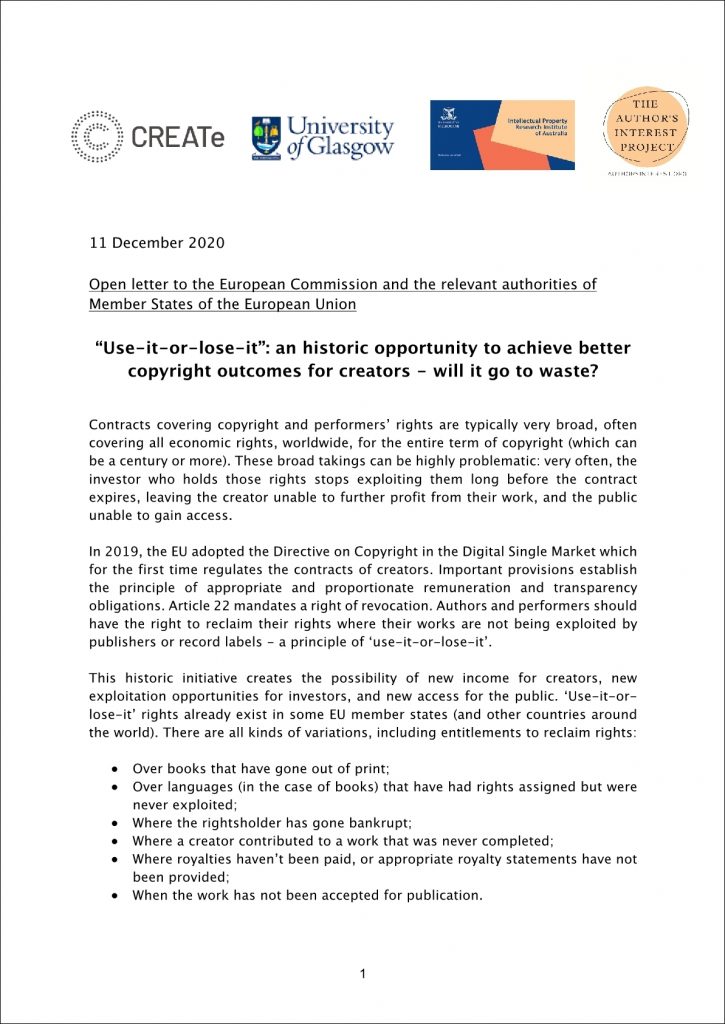A group of leading international academics has published an open letter concerning the right of revocation. This new right, regulating copyright contracts, is provided for in article 22 of the recent EU Directive on Copyright in the Digital Single Market.
The letter addressed to the European Commission and the relevant national authorities of EU Member States, identifies the revocation right as “an historic opportunity to achieve better copyright outcomes for creators”, and calls upon governments to explicitly address the right in their consultations about implementing the Copyright Directive.
The letter builds on a collaborative research project between CREATe and the Intellectual Property Research Institute of Australia (IPRIA), University of Melbourne, with the reCreating Europe consortium. The project maps all provisions allowing authors and performers to reclaim their rights. Such laws are already a part of national laws of many EU Member States in some form. What are the lessons that can be carried forward into article 22’s implementation process?
Interventions may include very different entitlements to reclaim rights, for example over books that have gone out of print, over unpaid royalties or where a rightsholder has gone bankrupt.
The research uncovered more than 150 currently binding provisions. The majority of the EU Member States offer some revocation rights to their creators, but they are often limited to certain types of works or agreements. Termination is only one of the possible effects of reversion provisions. Most of the rights are not brought to effect automatically, but require creator’s action to make changes to the contractual relationship, which means that the right can be a starting point for renegotiating contracts. Current provisions typically are modelled on analogue practices, and do not reflect digital uses.
The open letter argues that the right of revocation introduced by art. 22 of the Copyright Directive offers a “once-in-a-generation opportunity” to secure new income for creators, new exploitation opportunities for investors and new access for the public. It could help to reclaim culture that would otherwise be lost and provide creators with meaningful new rights to better their position in a post-COVID world. The letter draws attention to the thorny issue of digital exploitation: how should the law treat works which are technically available online without being meaningfully exploited?
The results of the collaborative project of CREATe, IPRIA and reCreating Europe can be explored via a Reversion Rights Resource which we are launching today. A map feature explores different revocation rights for authors and performers, enabling comparisons across Europe.
A complete record of reversion rights along with a commentary on general trends, characteristics, and categories of mapped reversion rights is available in a new CREATe working paper ‘Reversion Rights in the European Union Member States’ by Dr Ula Furgał, a postdoctoral researcher at CREATe.

Reversion Rights in the European Union Member States by Ula Furgał
CREATe Working Paper 2020/11
The full paper can be downloaded here.
11 December 2020 Open letter to the European Commission and the relevant authorities of Member States of the European Union “Use-it-or-lose-it”: an historic opportunity to achieve better copyright outcomes for creators - will it go to waste? Contracts covering copyright and performers’ rights are typically very broad, often covering all economic rights, worldwide, for the entire term of copyright (which can be a century or more). These broad takings can be highly problematic: very often, the investor who holds those rights stops exploiting them long before the contract expires, leaving the creator unable to further profit from their work, and the public unable to gain access. In 2019, the EU adopted the Directive on Copyright in the Digital Single Market which for the first time regulates the contracts of creators. Important provisions establish the principle of appropriate and proportionate remuneration and transparency obligations. Article 22 mandates a right of revocation. Authors and performers should have the right to reclaim their rights where their works are not being exploited by publishers or record labels - a principle of ‘use-it-or-lose-it’. This historic initiative creates the possibility of new income for creators, new exploitation opportunities for investors, and new access for the public. ‘Use-it-or-lose-it’ rights already exist in some EU member states (and other countries around the world). There are all kinds of variations, including entitlements to reclaim rights: ● Over books that have gone out of print; ● Over languages (in the case of books) that have had rights assigned but were never exploited; ● Where the rightsholder has gone bankrupt; ● Where a creator contributed to a work that was never completed; ● Where royalties haven’t been paid, or appropriate royalty statements have not been provided; ● When the work has not been accepted for publication. These examples hint at the potential. However, our new analysis (mapping all reversion rights currently in existence in the EU) shows that these laws were modelled on analogue practices. They don’t fully take advantage of digital possibilities, and are often limited to certain kinds of works (such as books). Termination under these laws is never automatic. Instead, these rights act as the starting point for renegotiating contracts, helping ensure that long-term contractual relationships continue. However, they also provide an important safety valve to release contracts that have outlasted their time. EU Member states are now deep into the implementation process for the Copyright Directive, which must be completed by July 2021. However, few countries are expressly inviting consultation around Article 22, and some implementation proposals omit mention altogether. Even countries which already have use-it-or-lose-it rights in their national legislation do not deal explicitly with digital uses (except France in the limited case of books). It is a critical question how to treat works that are technically available online without being meaningfully exploited. All countries could benefit by taking this opportunity to think critically how use-it-or-lose-it rights could help creators and investors, and help reclaim culture that would otherwise be lost. The new EU mandate offers a once-in-a-generation opportunity to create meaningful new rights for creators - something that is especially important as we look for ways to rebuild the creative industries post-COVID. We ask Member States to include the revocation right explicitly in their consultations about implementing the Directive on Copyright in the Digital Single Market. We ask the Commission to collect information and conduct a study about the effects of revocation. Contacts Prof. Martin Kretschmer, Professor of Intellectual Property Law Director, CREATe (UK Copyright and Creative Economy Centre), University of Glasgow martin.kretschmer@glasgow.ac.uk Dr. Ula Furgal, Postdoctoral Researcher, CREATe, University of Glasgow ula.furgal@glasgow.ac.uk Assoc. Prof. Rebecca Giblin, ARC Future Fellow Director, Intellectual Property Research Institute of Australia (IPRIA), University of Melbourne rebecca.giblin@unimelb.edu.au The Author’s Interest Project (authorsinterest.org) and CREATe (create.ac.uk) are collaborating with reCreating Europe (https://www.recreating.eu/) on a project, mapping reversion rights. https://www.create.ac.uk/reversion-rights-resource-page/ First signatories Prof. Valérie-Laure Benabou, Aix-Marseille Université (AMU) Prof. Lionel Bently, Director, Centre for Intellectual Property and Information Law (CIPIL), University of Cambridge Prof. Maurizio Borghi, Director, Centre for Intellectual Property Policy & Management (Jean Monnet Centre of Excellence 2018-21), Bournemouth University Dr. Roberto Caso, Associate Professor of Comparative Private Law, Università di Trento Dr. Elena Cooper, Leverhulme Early Career Fellow, CREATe, University of Glasgow Prof. Estelle Derclaye, Professor of Intellectual Property Law, University of Nottingham Prof. Leonhard Dobusch, Professor of Business Administration, University of Innsbruck, and Academic Director of the Momentum Institute, Vienna Prof. Séverine Dusollier, School of Law, SciencesPo, Paris Prof. Christophe Geiger, Director, Research Department, Centre d’Etudes Internationales de la Propriété Intellectuelle (CEIPI), Université de Strasbourg Prof. Reto M. Hilty, Director, Max-Planck-Institute for Innovation and Competition Prof. P. Bernt Hugenholtz, Professor of Intellectual Property Law, Institute for Information Law (IViR), University of Amsterdam Dr. Martin Husovec, Assistant Professor of Law, London School of Economics Prof. Marie-Christine Janssens, Head of Unit, Centre for IT & IP Law (CiTiP) – imec, KU Leuven Prof. Thomas Margoni, Research Professor of Intellectual Property Law, Centre for IT & IP Law (CiTiP) – imec, KU Leuven Dr. Péter Mezei, Associate Professor of Law, Institute of Comparative Law and Legal Theory, University of Szeged Prof. Alexander Peukert, Chair in Civil and Intellectual Property Law, Goethe Universität, Frankfurt am Main Dr. João Pedro Quintais, Postdoctoral Researcher, Institute for Information Law (IViR), University of Amsterdam Prof. Marco Ricolfi, Chair of Intellectual Property Law, Department of Legal Studies, Turin University, and Co-Director of the Nexa Center of the Polytechnic of Turin Prof. Thomas Riis, Professor, Centre for Information and Innovation Law (CIIR), University of Copenhagen Dr. Sebastian Felix Schwemer, Associate Professor, Centre for Information and Innovation Law (CIIR), University of Copenhagen Dr. Caterina Sganga, Associate Professor of Comparative Private Law, Coordinator, reCreating Europe H2020 consortium, Scuola Superiore Sant’Anna, Pisa Prof. Martin Senftleben, Director, Institute for Information Law (IViR), University of Amsterdam Prof. Alain Strowel, Professor, UCLouvain and Université Saint-Louis Prof. Paul Torremans, Professor of Intellectual Property Law, Co-director, Commercial Law Centre, University of Nottingham Dr. Stef van Gompel, Associate Professor, Institute for Information Law (IViR), University of Amsterdam





